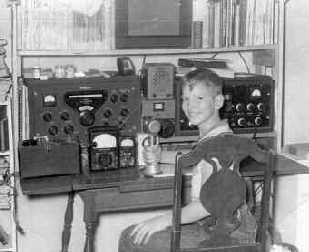|
The pages in this section provide a short bio. and cover family, technical links and areas that I could not figure out where else to put the information.
I especially enjoy restoring some of the classic Amateur Radio Communication equipment. My major focus in this area are the products manufactured by Collins Radio. My success in this area has been
directly related to my association with two Internet reflectors (similar to Chat Groups - see the links page) and my fellow members in the Collins Collectors Association. The availability of components, information and support is crucial to the restoration of these fine products. See the links page for additional information  . .
I was enticed into this hobby by two older brothers Robert (Bob) Meitzen W5ZHU and August (Augie) Meitzen W5GLN when I was 9 years old. My original call was KN5BLD then K5BLD (lapsed
many years ago). When I joined the military I went inactive and returned to the Amateur Radio Service (after a long wait) in 1996. After serving in the Military (Air
Force Central and South America) I went to the University of Houston and received a BS degree in Electrical Engineering.
My first job was with Collins Radio in the computer systems division. During my tenure at Collins Computer
Systems Development, I was visited by Art Collins (visit to the department). Needless to say as a young engineer I was nervous about the BOSS looking over my shoulder (he did). The major project I worked on
was the design of the "C" System. This system was several steps ahead in technology (512 megabit packet synchronous data loop). The concepts of networking multiple CPU's and Peripherals was a first. This idea has
since been copied by IBM, DEC, and others. Another first was the 64 bit processor. We even used software logic simulators that delivered PC board layouts to Gerber Plotters (Glass Plate) for rapid production
deployment. A interesting story about Art relates to the lights on the "C" System -- He allowed one light -- the RUN light. At the time IBM Computers had many, many lights. When the CPU was active there were many
flashing lights -- an impressive sight. Art Collins said,"Collins computers don't need lights -- period".
|

